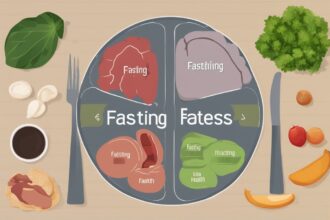Fasting, an age-old practice rooted in various cultural and religious traditions, has gained significant attention in recent years for its potential health benefits. One area of growing interest is the connection between fasting and liver health. The liver, a vital organ responsible for detoxification, metabolism, and nutrient storage, can benefit immensely from strategic fasting practices. In this comprehensive guide, we’ll explore how boosting liver wellness through fasting can support optimal liver function, enhance detoxification, and promote overall well-being.
The Role of the Liver in Overall Health
The liver is often referred to as the body’s powerhouse due to its multifaceted roles. It processes nutrients from the food we eat, filters toxins from the blood, produces bile for digestion, and regulates blood sugar levels. However, modern lifestyles—marked by poor dietary choices, stress, and exposure to environmental toxins—can overburden the liver, leading to conditions like fatty liver disease, inflammation, and impaired detoxification. Supporting liver health is crucial for maintaining energy, immunity, and metabolic balance. Fasting, when done correctly, can play a pivotal role in boosting liver wellness through fasting by giving the organ a much-needed break to repair and regenerate.
How Fasting Supports Liver Detoxification
Fasting involves abstaining from food for a specific period, which can range from a few hours to several days, depending on the method. During fasting, the body shifts its energy from digestion to other critical processes, including detoxification and cellular repair. The liver, which is central to detoxification, benefits from this metabolic shift. Studies suggest that fasting can enhance autophagy—a cellular “clean-up” process—allowing the liver to remove damaged cells and toxins more effectively. By reducing the intake of processed foods and sugars, fasting also helps decrease fat accumulation in the liver, a key factor in boosting liver wellness through fasting. For more insights on detoxification, check out our related post on Detox Diets and Liver Health.
Types of Fasting for Liver Health
Not all fasting methods are created equal, and choosing the right approach is essential for maximizing benefits to the liver. Intermittent fasting (IF), which alternates periods of eating and fasting (e.g., 16:8 or 5:2 plans), is one of the most popular and sustainable options. Time-restricted eating, where meals are consumed within a specific window each day, can also reduce the liver’s workload. Extended fasting, lasting 24–72 hours, may offer deeper detoxification benefits but should be approached with caution and medical supervision. Each of these methods contributes to boosting liver wellness through fasting by promoting fat metabolism and reducing inflammation. Learn more about intermittent fasting in our detailed guide on Intermittent Fasting Basics.
Scientific Evidence Linking Fasting and Liver Function
Emerging research supports the idea that fasting can positively impact liver health. A 2020 study published in the journal Cell Metabolism found that intermittent fasting reduces liver fat and improves insulin sensitivity, both of which are critical for preventing non-alcoholic fatty liver disease (NAFLD). Another study highlighted that fasting triggers the production of ketone bodies, which can protect liver cells from oxidative stress and inflammation. These findings underscore the potential of boosting liver wellness through fasting as a natural and accessible strategy for liver support. However, more long-term human studies are needed to fully understand the mechanisms and benefits. For additional reading on liver conditions, explore our article on Understanding Fatty Liver Disease.
Practical Tips for Fasting to Support Liver Health
While fasting offers promising benefits, it must be done thoughtfully to avoid stressing the body or liver. Start with shorter fasting windows, such as 12–14 hours overnight, and gradually increase the duration as your body adapts. Stay hydrated by drinking plenty of water, herbal teas, or black coffee during fasting periods, as dehydration can hinder detoxification. Avoid overeating during eating windows, and focus on nutrient-dense foods like leafy greens, healthy fats, and lean proteins to nourish the liver. If you’re new to fasting, consult a healthcare provider, especially if you have pre-existing liver conditions or other health concerns. These steps can optimize the process of boosting liver wellness through fasting. For dietary tips to complement fasting, see our post on Liver-Friendly Foods.
Potential Risks and Precautions
While fasting can be beneficial, it’s not suitable for everyone. Prolonged fasting without proper guidance can lead to nutrient deficiencies, fatigue, or even liver stress in extreme cases. Individuals with conditions like diabetes, advanced liver disease, or eating disorders should avoid fasting unless under medical supervision. Pregnant or breastfeeding women and those on certain medications should also exercise caution. Listening to your body and prioritizing safety is key to successfully boosting liver wellness through fasting. If you’re unsure where to start, our guide on Safe Fasting Practices offers valuable advice to ensure a balanced approach.
Disclaimer: The information provided in this article is for educational purposes only and should not be considered medical advice. Fasting may not be suitable for everyone, and individual health conditions, medications, or lifestyle factors can influence its safety and effectiveness. Always consult with a qualified healthcare professional or dietitian before starting any fasting regimen, especially if you have pre-existing liver conditions or other health concerns. The authors and publishers of this content are not responsible for any adverse effects resulting from the application of the information discussed.
References
- Intermittent Fasting and Metabolic Health: Implications for Liver Function – NCBI
- Effects of Intermittent Fasting on Liver Fat and Insulin Sensitivity – Cell Metabolism
- Intermittent Fasting: Surprising Update – Harvard Health Publishing
- Fasting Diet: Can It Improve My Health? – Mayo Clinic
- Intermittent Fasting: What Is It, and How Does It Work? – Johns Hopkins Medicine
This content is for informational purposes only and not a substitute for professional advice.






